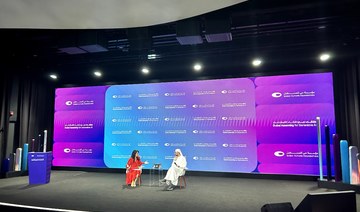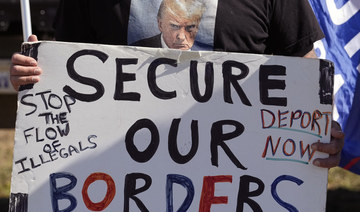LONDON: European Union negotiators clinched a deal Friday on the world’s first comprehensive artificial intelligence rules, paving the way for legal oversight of technology used in popular generative AI services like ChatGPT that has promised to transform everyday life and spurred warnings of existential dangers to humanity.
Negotiators from the European Parliament and the bloc’s 27 member countries overcame big differences on controversial points including generative AI and police use of facial recognition surveillance to sign a tentative political agreement for the Artificial Intelligence Act.
“Deal!” tweeted European Commissioner Thierry Breton, just before midnight. “The EU becomes the very first continent to set clear rules for the use of AI.”
The result came after marathon closed-door talks this week, with the initial session lasting 22 hours before a second round kicked off Friday morning.
Officials were under the gun to secure a political victory for the flagship legislation but were expected to leave the door open to further talks to work out the fine print, likely to bring more backroom lobbying.
The EU took an early lead in the global race to draw up AI guardrails when it unveiled the first draft of its rulebook in 2021. The recent boom in generative AI, however, sent European officials scrambling to update a proposal poised to serve as a blueprint for the world.
The European Parliament will still need to vote on it early next year, but with the deal done that’s a formality, Brando Benifei, an Italian lawmaker co-leading the body’s negotiating efforts, told The Associated Press late Friday.
“It’s very very good,” he said by text message after being asked if it included everything he wanted. “Obviously we had to accept some compromises but overall very good.” The eventual law wouldn’t fully take effect until 2025 at the earliest, and threatens stiff financial penalties for violations of up to 35 million euros ($38 million) or 7 percent of a company’s global turnover.
Generative AI systems like OpenAI’s ChatGPT have exploded into the world’s consciousness, dazzling users with the ability to produce human-like text, photos and songs but raising fears about the risks the rapidly developing technology poses to jobs, privacy and copyright protection and even human life itself.
Now, the US, UK, China and global coalitions like the Group of 7 major democracies have jumped in with their own proposals to regulate AI, though they’re still catching up to Europe.
Strong and comprehensive regulation from the EU “can set a powerful example for many governments considering regulation,” said Anu Bradford, a Columbia Law School professor who’s an expert on EU and digital regulation. Other countries “may not copy every provision but will likely emulate many aspects of it.”
AI companies who will have to obey the EU’s rules will also likely extend some of those obligations to markets outside the continent, she said. “After all, it is not efficient to re-train separate models for different markets,” she said.
Others are worried that the agreement was rushed through.
“Today’s political deal marks the beginning of important and necessary technical work on crucial details of the AI Act, which are still missing,” said Daniel Friedlaender, head of the European office of the Computer and Communications Industry Association, a tech industry lobby group.
The AI Act was originally designed to mitigate the dangers from specific AI functions based on their level of risk, from low to unacceptable. But lawmakers pushed to expand it to foundation models, the advanced systems that underpin general purpose AI services like ChatGPT and Google’s Bard chatbot.
Foundation models looked set to be one of the biggest sticking points for Europe. However, negotiators managed to reach a tentative compromise early in the talks, despite opposition led by France, which called instead for self-regulation to help homegrown European generative AI companies competing with big USrivals including OpenAI’s backer Microsoft.
Also known as large language models, these systems are trained on vast troves of written works and images scraped off the Internet. They give generative AI systems the ability to create something new, unlike traditional AI, which processes data and completes tasks using predetermined rules.
Under the deal, the most advanced foundation models that pose the biggest “systemic risks” will get extra scrutiny, including requirements to disclose more information such as how much computing power was used to train the systems.
Researchers have warned that these powerful foundation models, built by a handful of big tech companies, could be used to supercharge online disinformation and manipulation, cyberattacks or creation of bioweapons.
Rights groups also caution that the lack of transparency about data used to train the models poses risks to daily life because they act as basic structures for software developers building AI-powered services.
What became the thorniest topic was AI-powered facial recognition surveillance systems, and negotiators found a compromise after intensive bargaining.
European lawmakers wanted a full ban on public use of facial scanning and other “remote biometric identification” systems because of privacy concerns while governments of member countries wanted exemptions so law enforcement could use them to tackle serious crimes like child sexual exploitation or terrorist attacks.
Civil society groups were more skeptical.
“Whatever the victories may have been in these final negotiations, the fact remains that huge flaws will remain in this final text,” said Daniel Leufer, a senior policy analyst at the digital rights group Access Now. Along with the law enforcement exemptions, he also cited a lack of protection for AI systems used in migration and border control, and “big gaps in the bans on the most dangerous AI systems”
EU reaches a deal on the world’s first comprehensive AI rules
https://arab.news/5qvgh
EU reaches a deal on the world’s first comprehensive AI rules
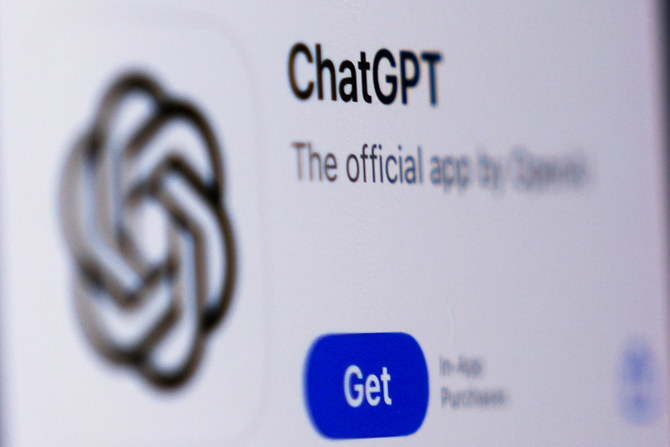
- Under the deal, the most advanced foundation models that pose the biggest “systemic risks” will get extra scrutiny
- Researchers have warned that these powerful foundation models could be used to supercharge online disinformation and manipulation, cyberattacks or creation of bioweapons
Warren Buffett says AI may be better for scammers than society. And he’s seen how
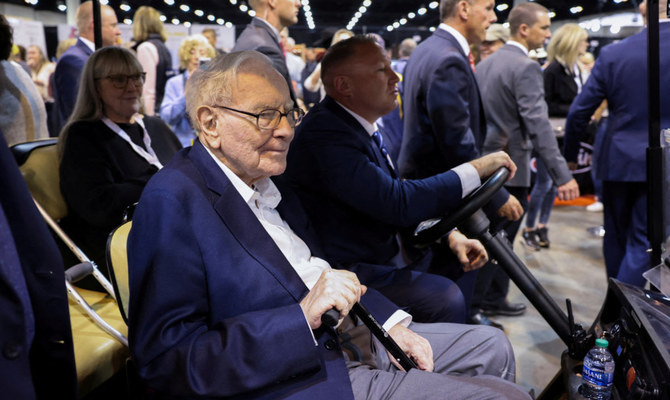
- The billionaire investing guru predicted scammers will seize on the technology, and may do more harm with it than society can wring good
OMAHA, Nebraska: Warren Buffett cautioned the tens of thousands of shareholders who packed an arena for his annual meeting that artificial intelligence scams could become “the growth industry of all time.”
Doubling down on his cautionary words from last year, Buffett told the throngs he recently came face to face with the downside of AI. And it looked and sounded just like him. Someone made a fake video of Buffett, apparently convincing enough that the so-called Oracle of Omaha himself said he could imagine it tricking him into sending money overseas.
The billionaire investing guru predicted scammers will seize on the technology, and may do more harm with it than society can wring good.
“As someone who doesn’t understand a damn thing about it, it has enormous potential for good and enormous potential for harm and I just don’t know how that plays out,” he said.
EARNINGS BEFORE MUSINGS
The day started early Saturday with Berkshire Hathaway announcing a steep drop in earnings as the paper value of its investments plummeted and it pared its Apple holdings. The company reported a $12.7 billion profit, or $8.825 per Class A share, in first the quarter, down 64 percent from $35.5 billion, or $24,377 per A share a year ago.
But Buffett encourages investors to pay more attention to the conglomerate’s operating earnings from the companies it actually owns. Those jumped 39 percent to $11.222 billion, or $7,796.47 per Class A share, led by insurance companies’ performance.
None of it that got in the way of the fun.
Throngs flooded the arena to buy up Squishmallows of Buffett and former Vice Chairman Charlie Munger, who died last fall. The event attracts investors from all over the world and is unlike any other company meeting. Those attending for the first time are driven by an urgency to get here while the 93-year-old Buffett is still alive.
“This is one of the best events in the world to learn about investing. To learn from the gods of the industry,” said Akshay Bhansali, who spent the better part of two days traveling from India to Omaha.
A NOTABLE ABSENCE
Devotees come from all over the world to vacuum up tidbits of wisdom from Buffett, who famously dubbed the meeting ‘Woodstock for Capitalists.’
But a key ingredient was missing this year: It was the first meeting since Munger died.
The meeting opened with a video tribute highlighting some of his best known quotes, including classic lines like “If people weren’t so often wrong, we wouldn’t be so rich.” The video also featured skits the investors made with Hollywood stars over the years, including a “Desperate Housewives” spoof where one of the women introduced Munger as her boyfriend and another in which actress Jaimie Lee Curtis swooned over him.
As the video ended, the arena erupted in a prolonged standing ovation honoring Munger, whom Buffett called “the architect of Berkshire Hathaway.”
Buffett said Munger remained curious about the world up until the end of his life at 99, hosting dinner parties, meeting with people and holding regular Zoom calls.
“Like his hero Ben Franklin, Charlie wanted to understand everything,” Buffett said.
For decades, Munger and Buffett functioned as a classic comedy duo, with Buffett offering lengthy setups to Munger’s witty one-liners. He once referred to unproven Internet companies as “turds.”
Together, the pair transformed Berkshire from a floundering textile mill into a massive conglomerate made up of a variety of interests, from insurance companies such as Geico to BNSF railroad to several major utilities and an assortment of other companies.
Munger often summed up the key Berkshire’s success as “trying to be consistently not stupid, instead of trying to be very intelligent.” He and Buffett also were known for sticking to businesses they understood well.
“Warren always did at least 80 percent of the talking. But Charlie was a great foil,” said Stansberry Research analyst Whitney Tilson, who was looking forward to his 27th consecutive meeting.
NEXT GEN LEADERS
Munger’s absence, however, created space for shareholders to get to know better the two executives who directly oversee Berkshire’s companies: Ajit Jain, who manages the insurance units; and Abel, who handles everything else and has been named Buffett’s successor. The two shared the main stage with Buffett this year.
The first time Buffett kicked a question to Abel, he mistakenly said “Charlie?” Abel shrugged off the mistake and dove into the challenges utilities face from the increased risk of wildfires and some regulators’ reluctance to let them collect a reasonable profit.
Morningstar analyst Greggory Warren said he believes Abel spoke up more Saturday and let shareholders see some of the brilliance Berkshire executives talk about.
“Greg’s a rock star,” said Chris Bloomstran, president of Semper Augustus Investments Group. “The bench is deep. He won’t have the same humor at the meeting. But I think we all come here to get a reminder every year to be rational.”
A LOOK TO THE FUTURE
Buffett has made clear that Abel will be Berkshire’s next CEO, but he said Saturday that he had changed his opinion on how the company’s investment portfolio should be handled. He had previously said it would fall to two investment managers who handle small chunks of the portfolio now. On Saturday, Buffett endorsed Abel for the gig, as well as overseeing the operating businesses and any acquisitions.
“He understands businesses extremely well. and if you understand businesses, you understand common stocks,” Buffett said. Ultimately, it will be up to the board to decide, but the billionaire said he might come back and haunt them if they try to do it differently.
Overall, Buffett said Berkshire’s system of having all the noninsurance companies report to Abel and the insurers report to Jain is working well. He himself hardly gets any calls from managers anymore because they get more guidance from Abel and Jain.
“This place would work extremely well the next day if something happened to me,” Buffett said.
Nevertheless, the best applause line of the day was Buffett’s closing remark: “I not only hope that you come next year but I hope that I come next year.”
Lebanese security forces arrest ‘TikTok influencer’ using platform to lure, assault minors

- Lebanese police say they arrested six, including three minors, involved in sexual assaults against minors
LONDON: Lebanese authorities arrested on Wednesday six people for their alleged involvement in sexual assaults on children, sometimes using the video-sharing platform TikTok to lure minors.
The Internal Security Forces said in a statement that among those arrested was a “TikTok influencer,” who is also a hairdresser, according to local media.
The six suspects are reportedly part of a criminal network comprising around 30 individuals involved in assaults against at least 30 children.
The Lebanese police said in a statement that “based on information obtained by the Cybercrime Bureau of the Judicial Police, and following a complaint lodged by a number of minors with the Public Prosecutor’s Office concerning sexual assaults, compromising photos and incitement to take drugs by members of a gang, the bureau in question has been able to arrest, to date, six people in Beirut, Mount Lebanon and North Lebanon.”
The arrested suspects also include three minors of Lebanese, Turkish, and Syrian nationalities who were active on TikTok, according to the statement.
Highlighting that the case has been probed for about a month, the Lebanese police vowed that “the investigation is continuing with a view to arresting all members of the gang.”
The head of the network, a famous TikTok personality, purportedly abused his fame and invited children to shoot TikTok videos with him, the independent Lebanese TV channel Al-Jadeed reported.
The TikToker would cut the children’s hair to gain their trust before inviting them to a party, where his accomplices sexually assaulted the children.
Violence against environmental journalists rises: Report

- State actors repsonsible for the attacks in most cases, says UNESCO
SANTIAGO: Journalists who report on environmental issues face increasing violence around the world from both state and private actors, UNESCO said on Thursday, highlighting that 44 of these journalists have been murdered between 2009 and 2023.
More than 70 percent of the 905 journalists the agency surveyed in 129 countries said they had been attacked, threatened or pressured, and that the violence against them had worsened — with 305 attacks reported in the last five years alone.
UNESCO, the UN cultural agency, listed in its report physical attacks such as injuries, arrests and harassment, as well as legal actions, including defamation lawsuits and criminal proceedings, among others.
At least 749 journalists, groups of journalists and media outlets have been attacked in 89 countries across all regions, its report said, with state actors being responsible for at least half and private for at least a quarter.
“State actors — police, military forces, government officials and employees, local authorities — are responsible for most of the attacks for which perpetrator information is available,” the report said.
These journalists were covering a wide range of topics, including protests, mining and land conflicts, logging and deforestation, extreme weather events, pollution and environmental damage, and the fossil fuel industry.
Men were more frequently attacked in general and women more frequently digitally, the report said.
Of the 44 journalists that were murdered in 15 countries while reporting on environmental issues, the report said only five cases resulted in convictions. Perpetrators remain unidentified in 19 of the 44 murders.
At least 24 journalists survived murder attempts.
UNESCO awards press prize to Palestinian journalists in Gaza

- UN director says prize is tribute to their courage
PARIS: UNESCO on Thursday awarded its world press freedom prize to all Palestinian journalists covering the war in Gaza, where Israel has been battling Hamas for more than six months.
“In these times of darkness and hopelessness, we wish to share a strong message of solidarity and recognition to those Palestinian journalists who are covering this crisis in such dramatic circumstances,” said Mauricio Weibel, chair of the international jury of media professionals.
“As humanity, we have a huge debt to their courage and commitment to freedom of expression.”
Audrey Azoulay, director general at the UN organization for education, science and culture, said the prize paid “tribute to the courage of journalists facing difficult and dangerous circumstances.”
According to the New York-based Committee to Protect Journalists (CPJ), at least 97 members of the press have been killed since the war broke out in October, 92 of whom were Palestinians.
The war started with Hamas’s unprecedented October 7 attack on Israel that resulted in the deaths of 1,170 people, mostly civilians, according to an AFP tally of Israeli official figures.
Israel estimates that 129 captives seized by militants during their attack remain in Gaza. The military says 34 of them are dead.
Israel’s retaliatory offensive against Hamas has killed at least 34,596 people in Gaza, mostly women and children, according to the Hamas-run territory’s health ministry.
Russian state media is posting more on TikTok ahead of the US presidential election, study says
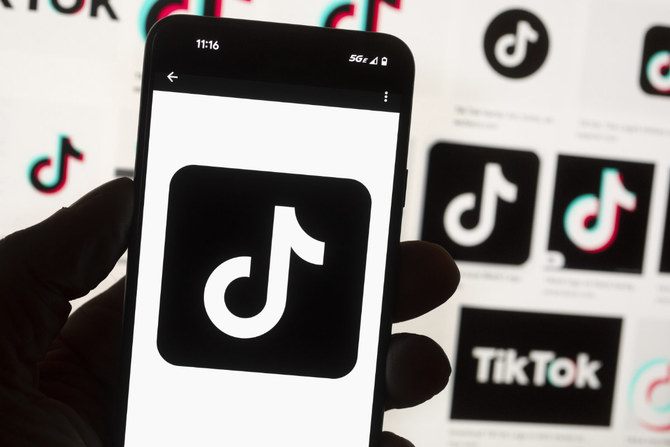
- State-linked accounts are also active on other social media platforms and have a larger presence on Telegram and X than on TikTok, says Brookings Institution report
- The report comes after Biden last month signed legislation forcing TikTok’s parent company — China-based ByteDance — to sell the platform or face a ban in the US
Russian state-affiliated accounts have boosted their use of TikTok and are getting more engagement on the short-form video platform ahead of the US presidential election, according to a study published Thursday by the nonprofit Brookings Institution.
The report states that Russia is increasingly leveraging TikTok to disseminate Kremlin messages in both English and Spanish, with state-linked accounts posting far more frequently on the platform than they did two years ago.
Such accounts are also active on other social media platforms and have a larger presence on Telegram and X than on TikTok. However, the report says user engagement — such as likes, views and shares — on their posts has been much higher on TikTok than on either Telegram or X.
“The use of TikTok highlights a growing, but still not fully realized, avenue for Russia’s state-backed information apparatus to reach new, young audiences,” reads the report, which drew data from 70 different state-affiliated accounts and was authored by Valerie Wirtschafter, a Brookings fellow in foreign policy and its artificial intelligence initiative.
The study notes that most posts do not focus on US politics but other issues, like the war in Ukraine and NATO. However, those that do tend to feature more divisive topics like US policy on Israel and Russia, and questions around President Joe Biden’s age, the Brookings report says.
A TikTok spokesperson said the company has removed covert influence operations in the past and eliminated accounts, including 13 networks operating from Russia.
The spokesperson said TikTok also labels state-controlled media accounts and will expand that policy in the coming weeks “to further address accounts that attempt to reach communities outside their home country on current global events and affairs.”
The Brookings report comes after Biden last month signed legislation forcing TikTok’s parent company — China-based ByteDance — to sell the platform or face a ban in the US. The potential ban is expected to face legal challenges.



